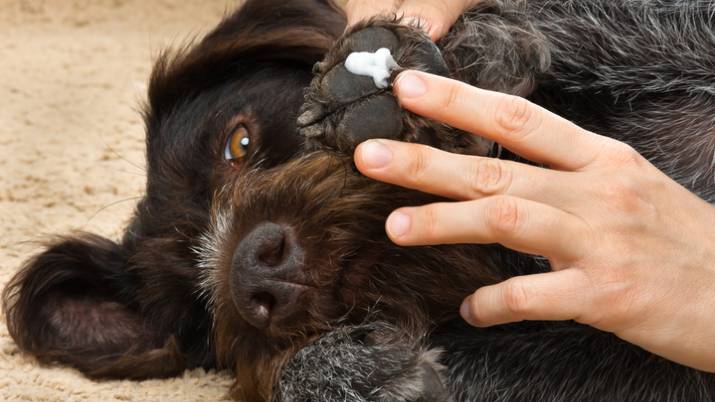Dry skin on dogs: A vet's guide to symptoms, causes and treatments
What are the causes of dry skin on dogs? And how can you fix it?

As well as looking unsightly, dry skin on dogs can be itchy or sore. Whether your dog has a small area of scurfy dandruff, or smelly, greasy, flaky skin covering most of their body, it's important not to ignore it.
There are a variety of causes, from allergies to hormonal conditions. Your first instinct may be to turn to home treatments such as a good quality dog shampoo designed to tackle itchy, dry skin, but is this the right way to go?
The good news is that there are multiple treatment options available; with the correct diagnosis, your pooch will be looking and feeling better in no time. So, what are the symptoms that might go hand in hand with dry skin? What are the potential causes? And what treatments are available? Read on to find out!
What symptoms might I see if my dog has dry skin?
If your dog has dry skin, it's perhaps not surprising that you'll tend to notice flaky, scurfy skin, either in patches or generally. But depending on the cause, you might see other signs too. In some cases, you might notice hair loss or a particular smell. With some hormonal conditions that affect the skin, you might notice a change in their thirst, weight, or how often they pass urine. With allergies and parasite causes, you might notice itchiness, redness, and irritation of the skin. So, if your dog has dry skin, keep an eye out for any other symptoms too.
What can cause dry skin in dogs?
In some cases, your dog might be more prone to dry skin and dandruff, just like humans are. However, there is often an underlying cause. Bacterial infections of the skin (pyoderma), allergies, flea infestations, and yeast overgrowth can all lead to skin that appears dry. In these cases, you might also notice a smell associated with the yeast or bacteria, and the skin may be inflamed and itchy.
Hormonal conditions like hypothyroidism (low thyroid hormone) and Cushing's disease (overactive adrenal glands) can also cause dry skin. If your dog is hypothyroid, you might also notice them losing hair and gaining some extra pounds. They may seem more lethargic or depressed than normal. Dogs with Cushing's disease tend to have very thin skin and a thin fur coat due to alopecia. They also tend to drink and pant a lot and have a pot-bellied appearance. If your dog has Cushing's for a while without treatment, they might develop sore areas of skin, where excess calcium is deposited in the skin layer.
When should I take my dog to the vet?

There’s no NHS for pets. Veterinary care can be eye-wateringly expensive and most pets will need treatment for an illness or injury at some point in their life. It’s difficult to think about your animals being hurt or unwell, but you need to ask yourself: what would you do if you were faced with a vet bill for hundreds or thousands of pounds?
Before you start any treatment or supplements for your dog’s dry skin, it’s best to take them to the vet for a check-up. Your vet will be able to check for an underlying cause of the dry skin by examining your dog and doing any necessary tests. Certain causes of dry skin have specific treatments, like thyroid hormone supplements for hypothyroid dogs and anti-allergy or anti-inflammatory medication for those with allergies or dermatitis.
If no underlying condition is found, your vet will help advise you of how you can manage your dog's dry skin, perhaps with shampoos, moisturisers, or the home remedies above. Remember, though, if your dog's dry skin isn't improving after a month, or if it gets any worse during treatment, you should always go straight back to your vet.

What home treatments are there for dry skin in dogs?
If there is no underlying medical condition, there are some home remedies you can use to treat your dog's dry skin. However, it's essential to visit a veterinarian first to rule out any underlying illnesses that need specific treatment.
Firstly, you could try increasing the amount of essential fatty acids, omega-3 and omega-6. Good sources of fatty acids include oily fish, cod liver oil, and evening primrose oil. You could also try using coconut oil or olive oil as a moisturiser, but make sure you try it on a small area first to ensure your dog's skin doesn't react. Conditioning shampoos are also a good option for soothing dry skin on dogs, but make sure you find a specific dog shampoo, or ask your vet for a recommendation.
So, what do I do if my dog has dry skin?
If your dog has dry skin, it's tempting to turn a blind eye to it, especially if it's minor. However, dry skin can sometimes be uncomfortable for your dog. It can also be a sign of some underlying health issues. Make sure you contact a vet if you notice that your dog has dry skin. Consider adding a skin supplement, oily fish, or other sources of essential fatty acids. If you use a combination of veterinary advice and safe home remedies, there's no reason why your dog can't have the super skin they deserve!
PetsRadar Newsletter
Get the best advice, tips and top tech for your beloved Pets
Dr Hannah Godfrey is a small animal vet who graduated from the Royal Veterinary College in 2011 and began work straight away at a busy mixed practice. Initially, she treated all species, but focussed on small animals from 2014. She has a passion for soft tissue surgery, ultrasound, and canine and feline dentistry, having completed additional training in these areas.
